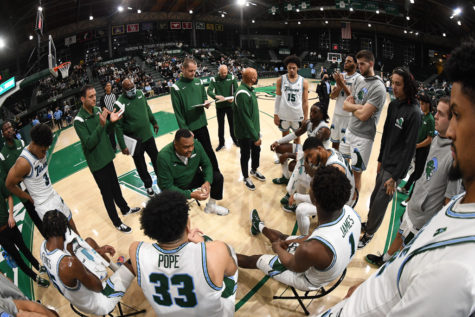Tulane basketball: What happens now?
March 15, 2023

The best Tulane men’s basketball season in over 20 years ended with a whimper. The team went into the American Athletic Conference Tournament Semifinals against the University of Memphis with nothing left in the tank. After playing four games in eight days to close out the season and a close win over Wichita State University the night before, the Green Wave was completely drained. The Tigers outworked the team at every level to beat them 94-54, the most lopsided tournament loss in school history.
The Green Wave failed to earn a bid to play postseason basketball, continuing a streak extending back to the 2000 season. The only way the team was going to make it to the NCAA Tournament was by winning the AAC, which proved extraordinarily difficult with juggernauts Houston and Memphis in the way. The team also fell short of earning a National Invitation Tournament bid despite having a better record than teams in that tournament. Controversially, fellow AAC teams University of Cincinnati and University of Central Florida earned tickets to the NIT despite finishing lower in the conference standings than Tulane University. This outcome likely had to do with the Green Wave’s relatively low NET ranking at 105, over 30 spots lower than its qualifying conference members.
Looking to next season, the entire team is eligible to return. Kevin Cross and Jaylen Forbes will have an extra year of eligibility due to COVID-19 eligibility rules. Both players were extremely valuable players to the Green Wave, earning All-AAC honors and were recognized as part of the National Association of Basketball Coaches All-District 24 second team.
Tulane’s leading scorer and All-AAC first teamer Jalen Cook will have two years of eligibility left, but he may decide to take his talents to the next level. After last season, Cook chose to enter his name in the 2022 NBA Draft while maintaining his college eligibility. After going through the early stages of the draft process, he decided to withdraw his name and return to play for Tulane. He improved his scoring and playmaking skills in his sophomore season, averaging just under 20 points per game and 4.9 assists per game. However, he is not projected to be in the top 100 prospects for this year’s draft and would likely go undrafted. Playing an additional year at Tulane and leading the team to a postseason berth would likely boost his potential draft stock.
If Cook or any of the other core members of the team move on, head coach Ron Hunter will need to learn to trust other players with more responsibility. Hunter leaned on his three All-AAC players and guard Sion James to play heavy minutes through the entire season, more so than any other coach in the conference. James and Forbes each played 37 and 36.5 minutes per game this season, leading the AAC in minutes by a sizable margin and putting them both in the top 20 most minutes played in the entire country. Cook and Cross also played heavy minutes every night, with the fifth player in the lineup rotating between Tylan Pope, Collin Holloway and R.J. McGee. The workload for the team’s four best players gave them tremendous wear-and-tear by the time they made the conference tournament.
If one of those core four were struggling or missed a game, the team suffered. Cook grappled with a lingering hamstring injury early in the season, and the team lost relatively easy non-conference matchups early in the year. He wasn’t able to fully return to form until January, and the Green Wave lost four times against a soft non-conference schedule. Tulane doesn’t have the legacy of success and name recognition for the committee to look past a mediocre start to the season, and that’s partially why the Green Wave missed postseason play despite winning 20 games.
Among the players Hunter chose to give significant minutes to, Cross is the only player taller than 6 foot 6 inches. Hunter’s small-ball lineups worked well with his fast paced, run-and-gun style of offense, but it also made the team struggle on the defensive end. Tulane had the highest scoring offense in the AAC with 79.94 points per game but also allowed the second most points in the conference. Often, James was asked to guard the opposing team’s big man around the basket, despite being more suited as a perimeter defender at 6 foot 5 inches. The team’s lack of size allowed teams to grab far more rebounds than Tulane, as they had the second worst rebounding margin in the conference.
The defensive and rebounding struggles weren’t helped by the absence of freshman Percy Daniels for most of the season. The 6-foot-9-inches center was a highly touted recruit coming out of Baton Rouge and was the third highest ranked big man in Louisiana while winning two Class 3A State Championships. It seemed like he would have opportunities to contribute early as one of the team’s few big men. However, Daniels’ first season at Tulane started rough when he encountered a groin injury at the start of preseason. This setback kept him from crucial development time with Coach Hunter and his teammates. As a result, Daniels barely played this season, only appearing in four games during garbage time.
The 2023-24 season will be the best opportunity for Tulane to make a run at winning the AAC. Houston, Cincinnati and UCF will make the jump to the Big 12 Conference next season, and the Green Wave will be full of experienced players hungry to make some noise.









Leave a Comment